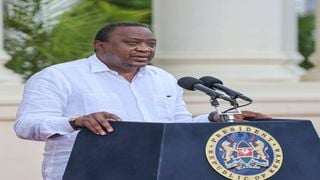
President Uhuru Kenyatta.
Politics
Premium
Fate of 2022 polls now lies with Uhuru, Parliament
The fate of the 2022 General Election lies with Parliament and President Uhuru Kenyatta following a court’s finding that the electoral agency lacks a quorum and cannot make policy decisions or conduct its business.
Though the elections date is cast in stone (August 9, 2022), preparations for them may be thrown in limbo if Parliament rejects the nominations of four commissioners, whose vetting started yesterday.
If they are rejected, that will force a fresh search for candidates to fill the four vacancies that occurred in 2017 and 2018.
The situation is so delicate that if one of the current three commissioners vacates office, the Independent Electoral and Boundaries Commission (IEBC) will become unconstitutional.
For three years, IEBC has been operating with the bare minimum number of members set in the Constitution.
Article 250(1) says “each commission shall consist of at least three, but not more than nine, members”.
The finding of the High Court, affirmed last week by the Court of Appeal, can potentially throw Kenya into a constitutional crisis as the two arms of government (Legislature and Executive) are yet to complete filling IEBC vacancies so it can carry out its business.
With the court’s finding, the two arms were ‘empowered' to frustrate the forthcoming elections, if they so wish.
IEBC chairman Wafula Chebukati did not answer phone calls or respond to text messages from the Nation on whether the agency intends to challenge the court’s findings.
In their judgment, the seven-judge appeals bench said an election is not a one-time event but a process.
“There are very many policy decisions that must be made by Commissioners in their meetings and such meetings must not only be quorate, but also the decisions, which bind the entire Commission, and have major impact and consequences on the country’s politics, must be arrived at in accordance with the dictates of the Constitution and the IEBC Act,” said Justice Daniel Musinga, president of the court.
IEBC’s decisions, he said, must therefore be either unanimous or supported by a clear majority of commissioners.
“Parliament, well aware of the provisions of Article 250(1) of the Constitution, enacted the IEBC Act and stipulated that the Commission shall consist of a Chairperson and six other members. Appreciating the mandate of the Commission, Parliament fixed the quorum at five members,” Justice Musinga said.
“The resignation of the four Commissioners took place way back in 2017. It is unfathomable that for almost four years since then, the vacancies have not been filed.”
Parliament, he said, did not want IEBC vacancies to remain unfilled for a long period. “That is why the President is required to publish a notice of a vacancy within such a short period upon occurrence of such a vacancy.”
Justice Patrick Kiage, for his part, noted that an attempt to reduce the IEBC quorum from five to three via the Elections Laws (Amendment Bill), 2017, passed by the National Assembly on October 11, 2017, was declared unconstitutional and invalid by the High Court on April 6, 2018.
The nullification of the amendment stemmed from a case filed by the Katiba Institute. The effect of the decision was to keep the quorum at five. The Court of Appeal explained that to hold that the quorum could be anything less than half of the membership of seven is to weaken the commission.
“It is instructive that the Constitution at Article 250(1) provides that Chapter Nine Commissions shall have a minimum of three and a maximum of nine Commissioners. It would seem to me unreal and plainly illogical to suppose that the same quorum of three would apply to all commissions be they constituted by three, five, seven or fifteen commissioners,” Justice Kiage said.
“I think that the impracticality of such a position is plain to see and I would have to go against the canons of statutory interpretation to arrive at such a construction.”
Another judge, Gatembu Kairu, said the composition and quorum of the commission are not the same thing.
“Article 250 of the Constitution does not, with respect, address the question of quorum of the Commission. It is a provision on composition. It sets the minimum number of persons who must make up the Commission,” he explained.
“Quorum speaks to the minimum number of commissioners that must be present to make a binding decision. It speaks to the number of commissioners who, when duly assembled, are legally competent to transact business of the Commission.”
Judge Francis Tuiyott said the scheme of the IEBC Act and the regulations is that by providing for a prompt mechanism for filling vacancies, IEBC should have its full membership.
The judge said the mechanisms for filling vacancies recognise that, given its important constitutional mandate, IEBC should carry out its functions with all hands on deck.
“To allow the quorum of the Commission to oscillate with the actual number of members at any time would be to countenance a possibility that for as long as the numbers do not fall below three, then the appointing authority need not promptly or at all trigger the process of filling the vacancies,” Justice Tuiyott said.
He added that a “drastically reduced membership could lead to a crunch in confidence by members of the public in the Commission’s ability to be independent and truly neutral”.





